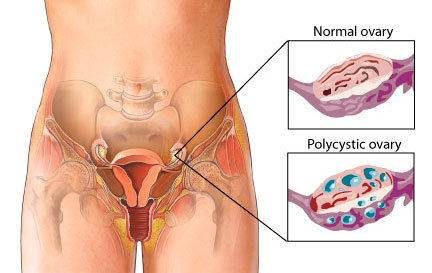
Polycystic Ovarian Syndrome
An issue that is beginning to affect more and more women and their reproductive cycle is Polycystic Ovarian Syndrome (PCOS). PCOS is an endocrine disorder that disrupts the natural course of a woman’s reproductive cycle. Often this is experienced when a woman’s level of sex hormones, estrogen and progesterone, are out of balance and the ovaries produce irregular amounts of androgens (male hormones). The imbalance of hormones seen in PCOS can result in the presence of irregular (but benign) ovarian cysts. Due to the nature of this disorder having PCOS can greatly impact a woman’s fertility.
Health conditions classified as a ‘syndrome’ means that experts cannot identify what is causing this disorder. Since the exact cause of PCOS is unknown it is considered a challenging disorder to treat by some or even deemed as incurable by others.
Some symptoms of PCOS include:
- Weight gain, often in the abdomen
- Increased body and facial hair
- Mood imbalances, such as anxiety and depression
- Hormonal acne
- Changes to reproductive cycle: irregular periods, absence of periods altogether
- Abnormal numbers of cysts on the ovaries
- Painful periods, heavy bleeding and immense discomfort and cramping
- Irregular blood sugar
PCOS and other female hormonal imbalances are so frequent that is a common stereotype that all women are, ‘crazy, hormonal, emotional wrecks’ at their time of the month. We are lead to believe that pre-menstrual stress is a normal part of the female reproductive cycle and it’s something we must learn to live with on a monthly basis. Ladies, did you know that you actually don’t need to suffer from PMS? (say what?) That’s right. The reason that not every woman suffers from it and that there are a multitude of symptoms is that PMS symptoms to that extreme are not ‘normal’ and is a cry from your hormones for help!
Wondering why your hormones are so out of whack?
Of course we naturally produce estrogen in our bodies – primarily in the ovaries. The issue occurs when external sources come in and manipulate our body’s level of estrogen; these include environmental disruptors, diet and lifestyle choices.
Environmental estrogens come from chemicals that occur in the environment that mimic estrogen in the body. Our body cannot tell the difference from these chemicals or the estrogen produced internally and these chemicals bind to the estrogen receptors manipulating estrogen levels. Environmental Estrogens can be found personal care products, in makeup and especially in plastics containing BPA such as food containers, baby bottles where the chemicals leak into the products we consume.
Estrogen levels can also be manipulated by particular foods we eat, as well as herbs we ingest in our supplements – these are known as phytoestrogens. Phytoestrogens block receptor sites against estrogen causing either an estrogenic or anti-estrogenic effect.
What’s the solution?
The current ‘solution’ is to put women with PCOS on the birth control pill as a means to regulate their menstrual cycle and help lower elevated hormones. One of the issues with this is that it does not address the root cause, meaning the hormones will likely become imbalanced again once the pill is stopped. Along with this comes the many side effects that the birth control pill can have on women – mood imbalances, irritability, elevated levels of copper, weight gain, blood clots and again, issues with fertility when coming off of the pill. Instead of looking for a ‘quick fix bandage solution’ there are natural remedies that can be used in the form of diet and herbal supplements that can help regulate women’s hormones and menstrual cycle.
Eat the right foods for happy hormones!
The foods we consume can play a big part on our endocrine system. Hormones are responsible for every reaction in our body. They control the way we feel, how we sleep, our energy levels, our mood, our libido, our weight and our overall metabolism. Hormones are made from amino acids, the building blocks of protein, and so it makes sense that diet plays a very critical role on keeping our hormones in check. What we eat, when we eat it, quality and how much we have of it can make a huge difference on how our hormones respond in our bodies.






Leave a Reply
You must be logged in to post a comment.